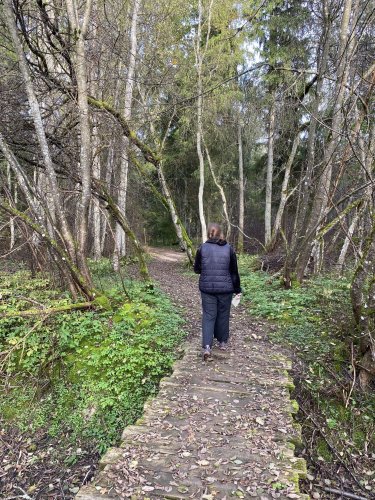
Re-Wild
How did it all start?
Six years ago, somewhere in Slovakia, for some reason, an organisation messed something up. And they were left without trainers for a big project with three interlinked trainings for youth workers. Through networks and friends, they asked Linda from Radi Vidi Pats and Alex from Minte Forte in Romania to help. Shortly before the training, they met, put together the programme and during the training discovered that they could work together as if they had known each other for years. Unfortunately, Alex couldn't make it to the second training, so Linda's colleague Stas helped out. And it seemed only logical that Stas and Alex should lead the third training. After the great feedback from the participants and their own inner feeling that this should continue, the three of them started to develop their own educational projects.
The initial projects focused on the mental well-being of young people and youth workers. It was a time of pandemic, when mental health was deteriorating rapidly, young people were losing motivation and youth workers were at higher risk of burnout. Working together, the trainers discovered that all three love working in nature, using natural resources, bringing people back to nature. Alex introduced the ecocentric approach, which they increasingly incorporated into their training. He founded his own association "Man and Tree", whose main goal was to bring people back to nature.
Maja from the Croatian organisation Aiki En also took part in one of these trainings and appreciated the impact of the ecocentric approach on the young people she worked with. Eventually, the Pan Flute project was born as a first step in the three organisations' aim to explore more deeply and offer others different methods to help support others through being part of nature. Re-Wild is the next step.
Why this project?
In our experience so far, we have seen that ecocentric approach works, but these theories and practices cannot be applied in all circumstances or to all target audiences. For example, Linda is interested in how working with nature can be used in an environment where there is no nature at all - in a prison. Stas is interested in how these methods can be used in international groups of young people with different abilities, health conditions, etc. So this will be an exploration of the adaptability of ecocentrism in different settings.
What is planned in this project?
Three people from each partner organisation are involved in this educational project, which will last more than a year. In March they will go to their first training in Romania, in May they will attend a second training in Latvia and in July and August they will participate in an online training on nature-based methods for working with people. Then it will be time to test which methods can be adapted to different target groups in different contexts. In January next year, they will meet in Croatia to share the results of their research and compile them into a single resource, which they will then present in their home countries.
How can you benefit from this project?
Follow the news on our website or FaceBook page. If you feel that this is something that interests you in more depth, you can apply to be involved during the testing of the methods, as well as at next year's conference and dissemination events. At the end of the project, you will be able to get the material developed, for free. You are also welcome to participate in other activities of our association, as we intend to use our newly acquired competences in our daily work.
Project “Re-Wild” is financed by the Erasmus+ Programme of the European Union that in Romania is administrated by the National Agency for Community Programs in the Field of Education and Vocational Training. The article reflects only the opinion of the author.